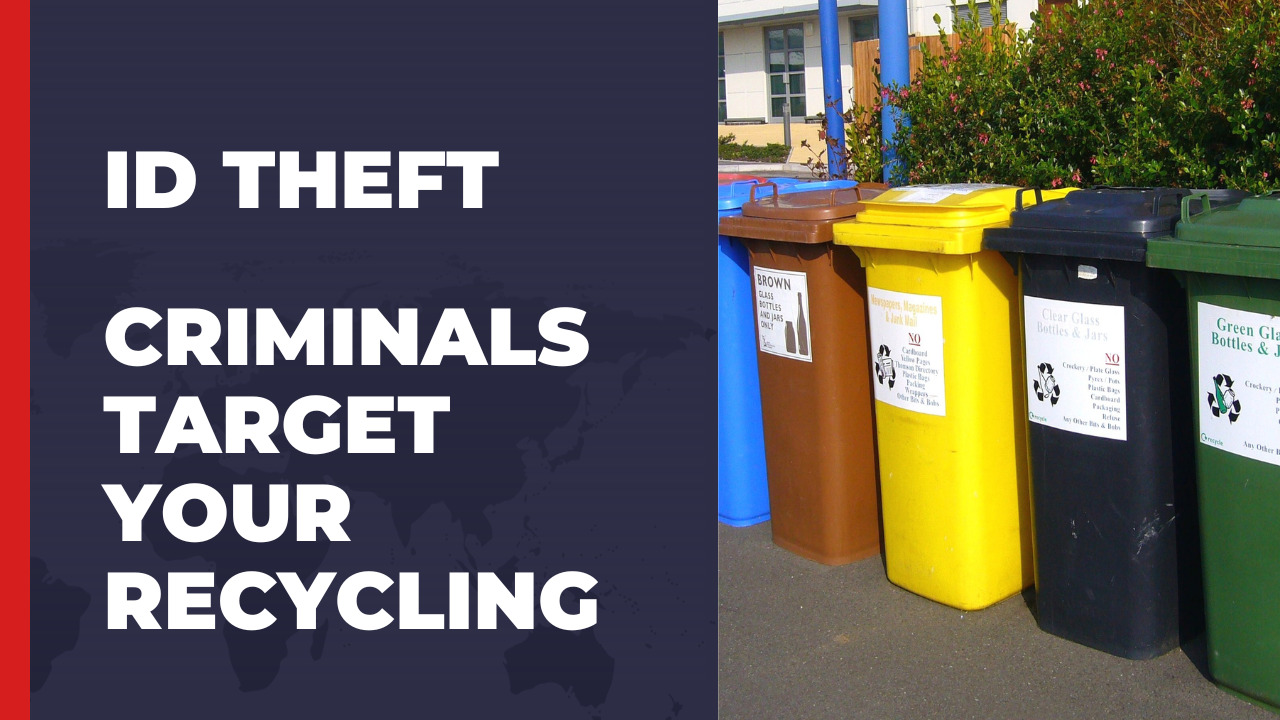Growing ID Theft: Criminals Exploit Recycling Practices
Identity theft continues to be a growing concern, extending beyond the digital world. You may be aware of the dangers of phishing emails and online data breaches, but did you know that your recycling bin could also put your identity at risk? Criminals are increasingly exploiting an often-overlooked source of personal information: discarded documents thrown in the trash or recycling.
It might be surprising to learn that dumpster diving is legal under certain circumstances, as items discarded in the trash are often classified as abandoned property. This means that an invasion of your personal data can happen when someone rummages through your thrown-away documents and unearths sensitive information that could be used to impersonate you.
As a result, you must take necessary precautions with your discarded papers. In this article, we will guide you through various tips and methods to help safeguard your personal information and protect yourself from this form of identity theft.
The Rise of Identity Theft
Emerging Threats
In recent years, identity theft has become a significant issue you should be aware of. It extends beyond the digital world, and criminals increasingly exploit different methods to steal personal information, including going through recycling materials. The Federal Trade Commission (FTC) even ranked identity theft in its top 10 list of consumer threats in 2022. As a result, at least 422 million individuals were impacted by data breaches during that year alone. The face of identity theft is changing, and being aware of new tactics used by criminals is essential to protect your information.
High-Risk Demographics
Some areas and demographics are more prone to identity theft than others. For example, Tuscaloosa, Alabama, reported the highest number of ID theft cases among metropolitan statistical areas in 2022. It’s crucial to understand the risks and take necessary precautions if you live in areas with higher reported identity theft.
To summarize, you need to stay informed about the rise of identity theft, emerging threats, and potential high-risk demographics so that you can take necessary steps to safeguard your personal information and avoid becoming a victim.

Role of Recycling in ID Theft
Identity theft is a growing concern, and criminals are finding new ways to exploit people’s personal information. One such method includes going through discarded items in recycling bins and dumpsters. In this section, we will discuss two common ways criminals use recycling to steal personal data: dumpster diving and recycle bin exploitation.
Dumpster Diving
Dumpster diving is rummaging through other people’s trash, looking for valuable or useful items, such as documents containing personal information. Although it may sound surprising, discarded documents can be a goldmine for thieves who want to steal your identity. Items discarded in the trash are often classified as abandoned property, and in 1988, the US Supreme Court ruled that trash-picking is legal.
To protect yourself from dumpster diving criminals, you should:
- Shred any documents containing personal information before disposing of them.
- Make sure to destroy the labels on prescription medication bottles.
- Be cautious about what you throw away and consider what information may be accessible to someone going through your trash.
Recycle Bin Exploitation
Recycle bin exploitation is similar to dumpster diving but specifically targets recycling bins, which often contain more documents and items with personal information. Criminals know people are more likely to discard sensitive paper documents, such as bank statements and utility bills, in their recycling bins.
To reduce the risk of recycle bin exploitation, you should:
- Always shred sensitive documents before putting them into recycling bins.
- Regularly empty your recycling bin to avoid an accumulation of sensitive documents.
- Be aware of recycling collection schedules in your area and avoid placing sensitive documents in the bin days before collection.
By being cautious and proactive in managing your discarded items, you can significantly lower the risk of becoming a victim of identity theft through recycling exploitation.
Preventive Tactics Against Recycling ID Theft
Personal Document Security
To protect yourself from identity theft through recycling, it is crucial to take preventive measures to safeguard your personal information. Start by reducing the amount of sensitive documents you receive through mail. Opt for electronic billing, statements, and notifications from your financial institutions and service providers. When disposing of your personal documents, shred any sensitive materials containing your personal information, such as Social Security numbers, account numbers, or passwords.
It’s also essential to be mindful of the information you share on social media, as cybercriminals can gather information about you and your whereabouts. Limit the amount of personal details you post online and adjust your privacy settings accordingly.
Secure Disposal and Recycling Practices
When it comes to recycling, proper disposal is key to preventing identity theft. Ensure you are using a cross-cut shredder for your sensitive documents, as it shreds the papers into smaller pieces compared to strip-cut shredders. This makes it more difficult for criminals to piece together your personal information.
Additionally, consider disposing of your shredded materials in multiple recycling bins or mixing them with other recyclable materials, like cardboard or cans, to make it harder for criminals to find your sensitive documents. Lastly, stay informed about your local recycling practices and guidelines to ensure the secure disposal of your recyclables and the protection of your personal data.






